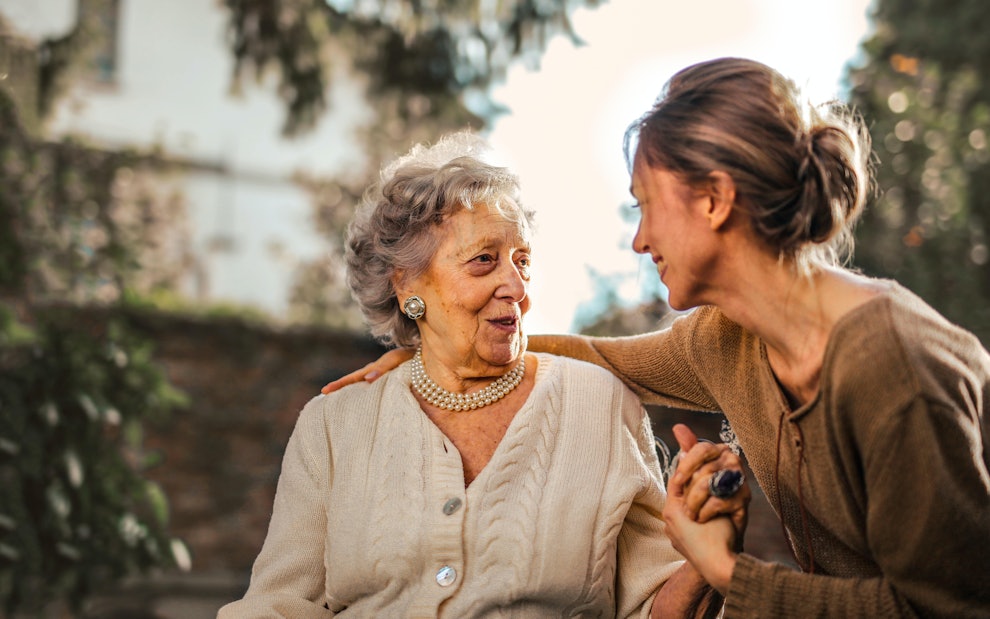What is Caregiver Burnout?: 7 Signs and Symptoms of Caregiver Burnout
Article at a glance
Caregiver burnout is the complete physical, emotional, and mental exhaustion resulting from caring for a loved one with an illness/condition over a period of time.
Caregiver burnout is common and can happen to anyone.
There are tips, resources, and support groups available to help ease the burden of caregiver responsibilities.

What is Caregiver Burnout?
Caregiver burnout is a state of mental, emotional, and physical exhaustion brought on by caring for a loved one. When a person takes on the role of a caregiver due to a loved one’s illness, the responsibility can be overwhelming and potentially have effects on a person’s well-being and mental health.
Caregiving responsibilities require a great deal from the individuals or family members who take them on, and without proper support and resources, burnout is almost inevitable.
What Causes Caregiver Burnout?
While many caregivers often take on the role out of genuine care and love for an individual, there are several reasons a person may experience burnout, including:
Lack of support
Neglecting physical, emotional, and mental health needs
Not taking adequate breaks or sharing caregiver responsibilities with others
Role confusion (when a person struggles to separate their role as a caregiver from other roles, such as spouse or child)
Overwhelming demands, particularly from those who need plenty of hands-on caregiving
Unrealistic expectations of what caregiving involves and its results
Refusing help or denying they are experiencing caregiving stress

7 Signs and Symptoms of Caregiver Stress and Burnout
There are a few signs that family caregivers may be experiencing burnout, including:
Feelings of depression
Feelings of anxiety
Avoiding/pulling away from others
Feeling irritable/resentful
Neglecting personal needs
Lack of energy
Neglecting physical, mental, or emotional health
How To Cope With Caregiver Burnout
Learning to cope with caregiver burnout can include:
Self-awareness: admitting you have caregiver burnout is important, especially so you can receive the proper help and resources to deal with it.
Asking for help: if you know you are experiencing caregiver burnout, asking for help is crucial. Whether this involves asking for other family members to help with responsibilities, contacting an assisted living facility, or asking for other resources, reaching out for help can alleviate the symptoms of caregiver burnout.
Getting support: seeking out and joining other caregiver support groups (in person or online) can help you realize you aren’t alone in struggling with caregiver burnout, which can make the feelings easier to manage.
Take care of yourself: while serving as a family caregiver can be demanding, you have to take care of yourself as well. Ensuring your physical, mental, and emotional needs are met will not only make caregiver burnout less likely but will allow you to be a better caregiver.

Tips to Prevent Caregiver Burnout
If you’re preparing for or have recently started caregiving, there are some tips to keep in mind that can help potentially prevent caregiver burnout.
Setting Realistic Expectations
When deciding to take on the role of caregiver, it can be easy to set unrealistic expectations of what the experience will be. Some realistic expectations include:
Not always receiving gratitude from your loved one: while they may appreciate you stepping in to care for them, they may struggle to show it at times, especially if they require immense help from you due to their illness. They may struggle with a loss of autonomy which can cause irritability and depression, among other effects. You may not always feel appreciated for the effort and time you put in, which can be difficult.
Being realistic about their condition/illness: it makes sense to hope for the best regarding your loved one’s condition and hope for their progress. It’s also important to be fully aware of the statistics and expectations about the condition/illness and be prepared to provide increased care if things get worse over time. Researching the condition and talking with your loved one’s primary care provider can give you a picture of how the condition may progress.
If they are able, having a conversation with your loved one about what they are expecting from you as a caregiver can help set better expectations. While you may need to negotiate and work out any disagreements you have about what your role is, making it a collaborative experience can make things easier for both of you.
Getting Adequate Support
Many underestimate how vital support can be as a caregiver. Some ways to ensure you have adequate support systems include:
Seeking out support groups: Do some research to see if there are any caregiver support services or groups in your area (if not, see if there are any suitable caregiver support group options online). Having people who understand the struggles of caregiving responsibilities can help you feel less isolated in the experience.
Seek support from family and friends: Additionally, it can be beneficial to have a support group of family and friends you can rely on to discuss caregiving issues, vent, or express your emotions in a safe setting.
Seek out a therapist: If you feel comfortable and you don’t have one already, seeking out a therapist can be a great way to express your feelings, fears, and struggles with someone who can listen and support you.
Taking Care of Yourself
When taking on a caregiver role, it can be easy to set aside your needs to focus solely on your loved one. However, your needs are still important as well. Some ways you can still care for your needs as a caregiver include:
Staying active: continuing to get regular physical activity, even if it’s as simple as taking a jog on a regular basis, can help you feel better and keep yourself in good physical shape.
Eat a healthy, well-rounded diet: eating a well-rounded diet can help you physically and mentally and can ensure you have the strength to care for your loved one.
Take breaks: while it can be difficult to do so, taking breaks every now and then from caregiving can help ensure you don’t end up burning out. Whether you have another family member step in, hire private care aides, contact assisted living facilities in your area or respite care services for extended breaks, make sure you have options that don’t involve you being the only source of care.
Take care of your mental health: having a therapist and/or support group can help you deal with the mental load of caregiving. You can also make time for other activities that can help you relax, such as meditation, reading, or journaling.
Know your capabilities: while you may want to do everything for your loved one, you are still one person who has limits. Be aware of what you are and aren’t capable of, and set expectations and find solutions accordingly.

Resources For Caregiver Burnout
There are resources that can be extremely helpful to caregivers, whether you are struggling to be an effective caregiver or need information to help in the process.
Family Caregiver Alliance
Family Caregiver Alliance is specifically aimed at helping caregivers. They provide resources and tools to help caregivers in a variety of ways, including tips, connections to support groups, and more.
Note: You can learn more about Family Caregiver Alliance by visiting their website here.
Caregiver Action Network
The Caregiver Action Network (CAN) is a nonprofit that seeks to provide resources and support for caregivers. They provide tips, stories, resources, support chats, and other tools to help caregivers.
Note: You can learn more about CAN by visiting their website here.
National Institute on Aging
The National Institute on Aging provides valuable information to caregivers. They have resources regarding long-term care planning, how to care for someone long-distance, how to care for those with Alzheimer’s disease and more.
Note: You can learn more caregiving tips from the National Institute on Aging on their website here.
Home Health Services
Home health services involve a wide variety of options that can be given in your home, including patient and caregiver education. These services can provide several of the same health services that one would receive in a doctor/hospital setting, making caregiving easier.
Note: To learn more about home health services, you can visit the official Medicare website’s page about it here.
FAQ
How long does it take to get over caregiver burnout?
There is no set timeline to get over caregiver burnout. Some may recover in a few days or weeks, some may even take years, depending on the individual.
What is Caregivers Syndrome?
Caregivers Syndrome is another name for caregiver burnout and can be characterized as a state of mental, emotional, and physical exhaustion brought on by caring for a loved one.
What are the qualities of a good caregiver?
Some qualities that are sought after in a caregiver include:
Patience
Compassion
Empathy
Detail-oriented
Trustworthy
Humorous
Cooperative
Attentiveness
Dependable
What should a caregiver not do?
Some things a caregiver should avoid doing include:
Withholding care
Not asking for help
Treating your loved one like a burden
Exceeding your limits
Making assumptions about a person’s condition/illness
Making your loved one feel ashamed of their condition/illness
What is “compassion fatigue?”
Compassion fatigue is defined as a term that describes the physical, emotional, and psychological impact of helping others through highly stressful or traumatic experiences. This can result in losing compassion for an individual (or for others) due to total exhaustion. Compassion fatigue can be mistaken for caregiver burnout, however, the burnout is actually a potential symptom of compassion fatigue.
Sources
- https://jamanetwork.com/journals/jama/article-abstract/1104895
- https://www.caregiving.org/wp-content/uploads/2021/01/full-report-caregiving-in-the-united-states-01–21.pdf
- https://www.caregiveraction.org/family-caregiver-toolbox
- https://www.cc.nih.gov/wecare/resources.html
- https://www.hopkinsmedicine.org/about/community_health/johns-hopkins-bayview/services/called_to_care/causes_symptoms_caregiver_burnout.html
- https://www.medicare.gov/what-medicare-covers/whats-home-health-care
Become a patient
Experience the Oak Street Health difference, and see what it’s like to be treated by a care team who are experts at caring for older adults.




